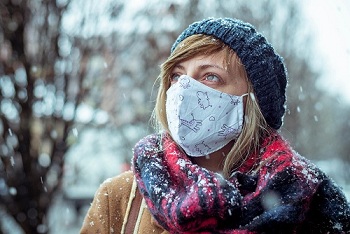COVID-19 Winter: University Of Utah Study Shows Correlation Of Seasonal Lower Temperatures And Increase Of SARS-CoV-2 Coronavirus Spread
Source: COVID-19 Winter Oct 16, 2020 5 years, 4 months, 1 day, 1 hour, 10 minutes ago
COVID-19 Winter: Researchers from the University of Utah in a new study has shown that individual particles of SARS-CoV-2 coronavirus undergo structural destabilization at relatively mild but elevated temperatures, strengthening the case for the COVID-19 resurgence in the coming winter.

The research findings are published on a preprint server and are currently being peer-reviewed.
https://www.biorxiv.org/content/10.1101/2020.10.12.336818v1
It has already been found that a common transmission route for SARS-CoV-2 virus, the causative agent of COVID-19 disease, is through aerosols created during sharp exhalation events, such as coughing or sneezing.
In addition it is known that viral particles frequently spread after their deposition on different surfaces.
Despite seasonal dependence and variation according to climate being expected early in the pandemic due to certain similarities with other human coronavirus diseases; we did not witness a sharp fall in the rates of infections during the summer of 2020, resulting in widespread doubts about COVID-19 seasonality.
In the structure of the virus, alongside envelope and spike proteins, SARS-CoV-2 also packages the RNA genome encapsidated with manifold copies of nucleocapsid proteins.
The virus also harbors thousands of copies of the matrix protein. All of this opens the door for constructing virus-like particles (without genetic material) amenable for research.
The study team from the University of Utah in Salt Lake City and the University of California in Davis (US) in this research employed atomic force microscopy to investigate the structural stability of individual SARS-CoV-2 virus-like particles at a range of different temperatures and before or after immobilization and drying out on a functionalized glass surface.
Corresponding author, Dr Michael Vershinin told Thailand Medical News, "The ability to make virus like particles based on the SARS-CoV-2 genome, combined with abundant available structural information allowing for high precision design strategies opens a unique opportunity for fast progress and allowed us to overcome the safety concerns associated with experiments on the full virus.”
Basically, the study team has utilized this technology to appraise the viral envelope's stability and associated proteins (i.e., matrix, envelope, and spike) under diverse environmental conditions.
The study team had previously shown that (akin to SARS-CoV) the expression of SARS-CoV-2 matrix, envelope, and spike proteins in transfected human cells is enough for the formation and release of virus-like particles through the same biological pathway that is used by the fully infectious virus.
Dr Vershinin added, "We demonstrate that even a mild temperature increase, commensurate with what is common for summer warming, leads to a dramatic disruption of viral structural stability, especially when the heat is applied in the dry state.”
The study involving the utilization of atomic force microscopy revealed that only a handful of SARS-CoV-2 viral particles retain their shape,
and even those extraordinary particles degraded almost instantly during scanning, which means they are likely already structurally impaired.
However one unexpected finding stemming from this study is how little heating it takes to degrade virus-like particles; more specifically, just 34 °C for as little as 30 minutes was sufficient for a rather dramatic effect. The effect is weaker for particles exposed to elevated temperatures in solution and stronger for exposing them in a dry state.
However, surfaces at 22 °C do not aid in their swift degradation, suggesting that common indoor surfaces and those located outdoors during colder seasons may indeed foster prolonged viral survival and, possibly, increased and extended viral spread.
The study results are consistent with other available non-mechanistic studies of viral infectivity and provide a single particle perspective on viral seasonality, consolidating at the same time the case for the resurgence of COVID-19 in the winter.
Dr Vershinin warned, "It is hard to estimate how all individual contributing factors would contribute to the epidemiological picture on the ground."
He added, "
Nonetheless, our study findings draw parallels between the stability of SARS-CoV-2 and the original SARS viruses and add to a growing body of research suggesting more viral spread is likely at lower temperatures via a variety of possible contributing factors.”
Many scientist and researchers are warning that the fast approaching winter season in the Northern Hemisphere is going to see a massive explosion of COVID-19 infections and already in countries like the United States, the beginning of the Autumn season is already seeing COVID-19 infections start to rise gradually. In the last 24 hours, America recorded 66,129 new COVID-19 infections and 874 Americans dying from the COVID-19. The situation is expected to worsen in coming weeks and months and Europe is also witnessing an exponential surge in new COVID-19 infections.
For more on
COVID-19 Winter, keep on logging to Thailand Medical News.
